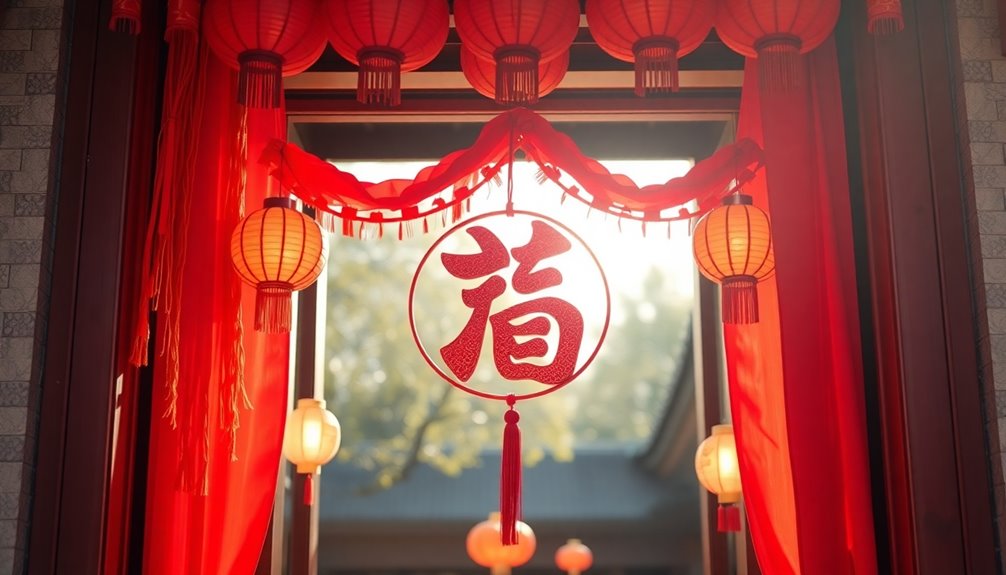The Chinese character "Fu," often displayed upside down during celebrations, symbolizes the arrival of good fortune. This placement relates to the homophony between the phrases for "upside-down" and "to arrive," reinforcing your hopes for prosperity and joy. Historically, this tradition dates back to the Ming Dynasty, spurred by legends that link the upside-down display to increased luck. You typically hang "Fu" upright on doors to invite fortune, but an upside-down version inside signifies blessings entering your home. If you're curious about the deeper meanings and traditions surrounding "Fu," there's much more to uncover.
Key Takeaways
- The upside-down "Fu" symbolizes the arrival of good fortune, playing on the homophony between "upside-down" and "to arrive" in Chinese.
- This tradition originated during the Ming Dynasty, where hanging "Fu" upside down became associated with luck and prosperity.
- Legends, such as a family accidentally hanging "Fu" upside down and receiving good fortune, reinforce the practice's significance.
- "Fu" is typically displayed upright on doors to attract fortune and upside down inside homes to signify blessings coming in.
- The character's upside-down placement enhances festive decor and is widely recognized in various cultures, especially during Chinese New Year celebrations.
Historical Origins
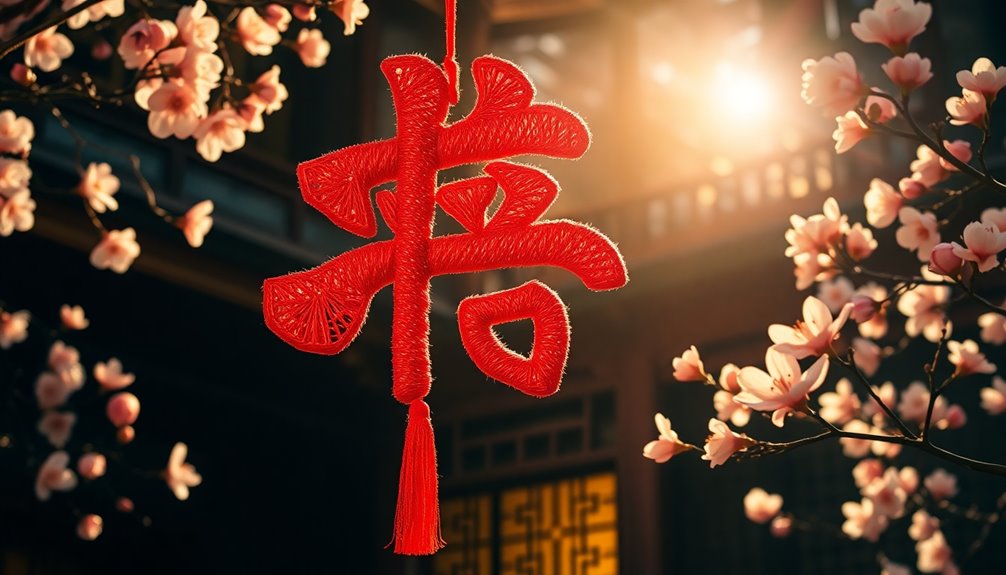
The character "Fu" has deep historical roots that trace back to ancient China. You'd find the earliest form of "Fu" inscribed on oracle bones from the Shang Dynasty, around 3,500 years ago. This character is an associative compound made up of four components: "示" (shi), "一" (yi), "口" (kou), and "田" (tian). It symbolizes abundance, prosperity, and offerings at an altar. During the late Shang Dynasty, its form became standardized, appearing hundreds of times in various styles. Interestingly, the character "Fu" originally represented divine protection, reflecting its significance in rituals and blessings. Fast forward to the Ming Dynasty, where an incident involving Empress Ma led to the tradition of pasting "Fu" upside down, a practice tied to luck that still endures in modern celebrations.
Cultural Significance
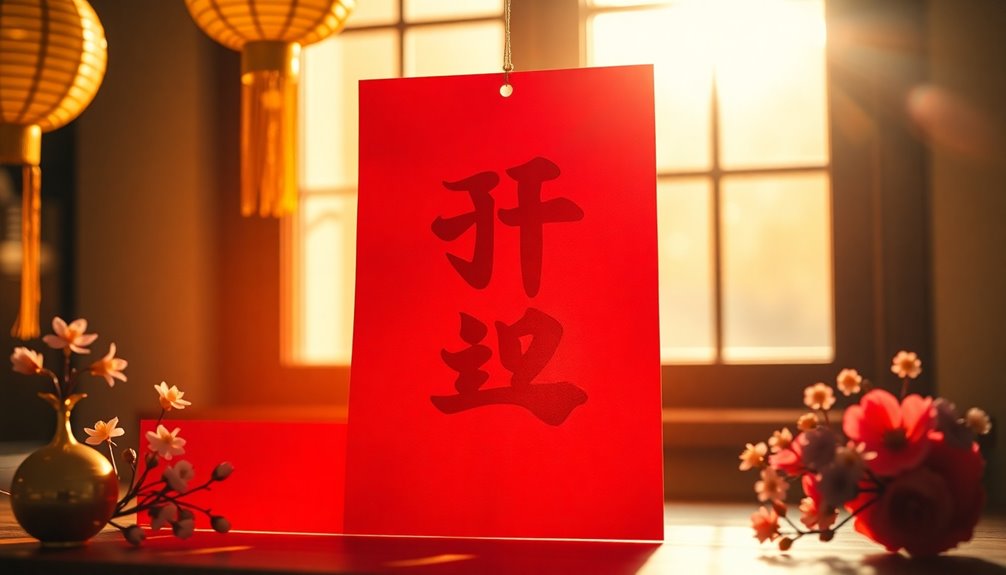
While exploring the character "Fu," you'll discover its rich cultural significance in Chinese society. This character symbolizes good fortune, happiness, and blessings, making it a staple during celebrations like the Chinese New Year.
When you see “Fu” pasted upside down on doors, it signifies that good fortune has arrived, linking the wordplay between “upside-down” and “to arrive. ” This playful interpretation not only brings a smile to those who notice it but also serves as a reminder to embrace positivity. Similarly, just as the upside-down “Fu” symbolizes good luck, being mindful of our surroundings can enhance our daily experiences. In the realm of home convenience, features like dip switch functionality in garage door openers empower homeowners to customize access and ensure security, further contributing to a sense of well-being and peace of mind.
Beyond just luck, "Fu" represents aspirations for harmony, wealth, and a fulfilling life. It's deeply rooted in traditional practices, reflecting desires for divine protection and the blessings of the God of Fortune. Additionally, the character "Fu" is commonly associated with the good luck trinity: Fu, Lu, Shou, embodying the wishes for prosperity, status, and longevity.
As you engage with "Fu," you'll appreciate its role in promoting joy, prosperity, and a connection to Chinese cultural heritage.
Linguistic Explanation
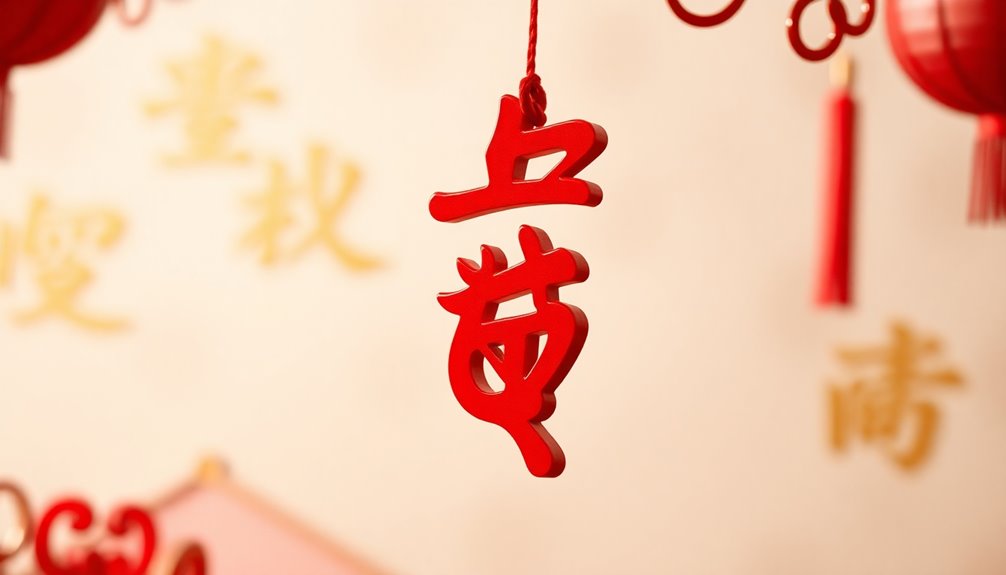
Understanding the linguistic intricacies of the character "Fu" reveals a fascinating blend of sound and meaning in the Chinese language.
The homophony between "upside-down" (倒, dào) and "to arrive" (到, dào) creates a clever wordplay. When you say "Fu upside-down," it sounds nearly identical to "Fu arrives," symbolizing the arrival of good fortune.
This pun plays a crucial role in the cultural significance of hanging the character upside down, a tradition that's been around for centuries. The phonetic similarity enhances its symbolic meaning, reflecting the flexibility of the Chinese language. This practice has become a widespread tradition, signifying the arrival of prosperity.
With multiple interpretations and a rich cultural lore, the character "Fu" has evolved, embodying the people's pursuit of happiness and good fortune.
Practical Applications
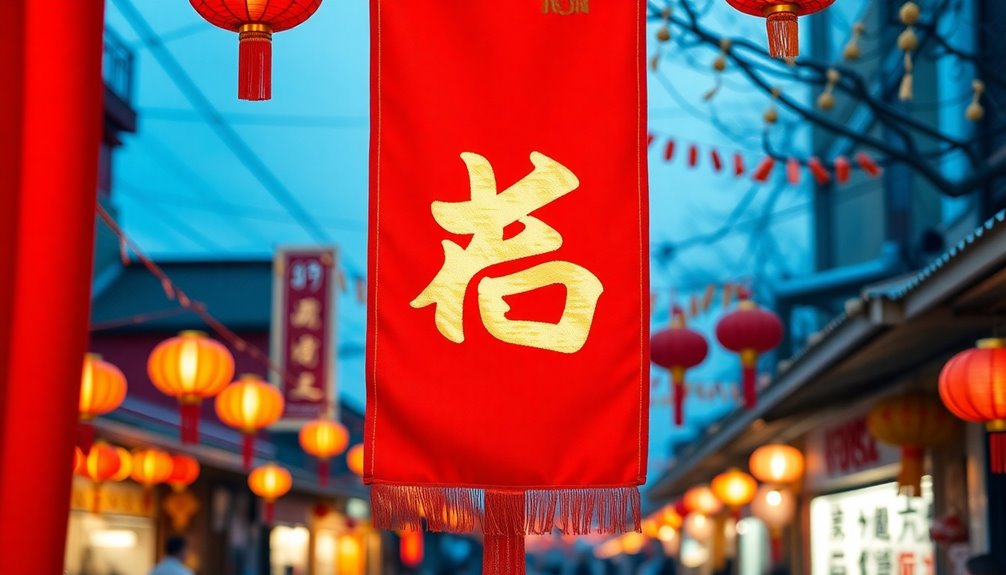
Displaying the character "Fu" in homes serves as a vibrant expression of cultural tradition and a symbol of good fortune. You'll often find it placed on doors and windows, usually crafted from diagonal red paper or fabric. This practice dates back to the Song dynasty and remains a beloved tradition, especially during Chinese New Year celebrations. The upside-down position cleverly plays on the word for "arrive," suggesting that good luck is on its way. The practice's historical significance reflects a cultural continuity and shared heritage among Chinese people. Whether in calligraphy, textiles, or ceramics, the character "Fu" also enhances artistic expressions. In today's digital age, you can see "Fu" in creative online displays, making it an integral part of cultural exchange and education, connecting you to a rich heritage.
Historical Legends
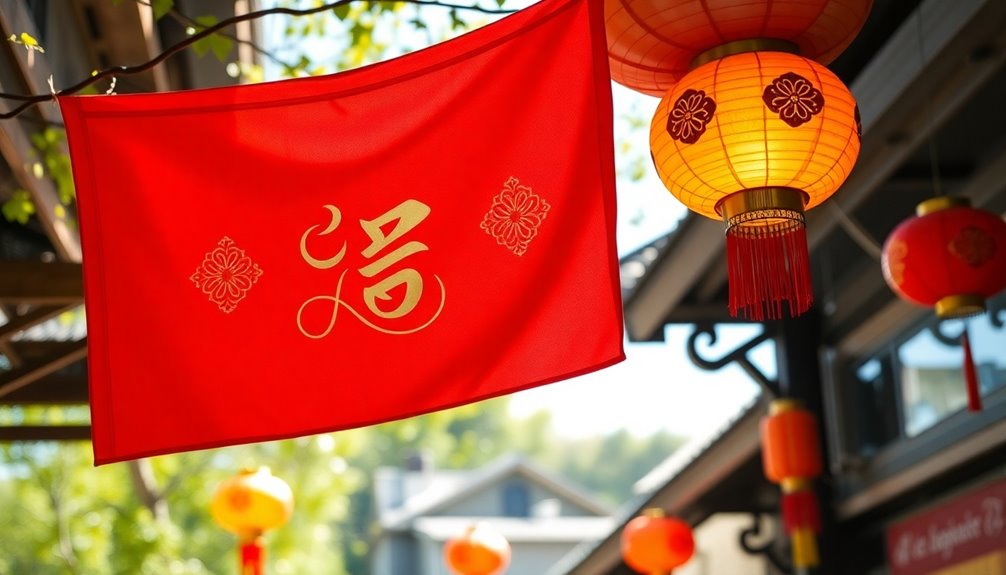
Throughout history, various legends have emerged to explain the significance of the character "Fu" and its upside-down placement.
One tale tells of a family that accidentally hung the character upside down, only to hear visitors remark that it sounded like "Fu arrives," sparking a tradition of good fortune. This belief is further supported by Fu Xi's teachings on the importance of community practices, which emphasize unity in seeking prosperity.
Another story features the Princess of Gong, where a butler's upside-down placement turned initial anger into royal favor, cementing the custom during the Spring Festival.
Empress Ma's intervention saved a family from execution for displaying Fu incorrectly, reinforcing the belief that it signifies wealth arriving.
These legends intertwine, symbolizing the hope for prosperity and highlighting the character's cultural importance in Chinese tradition.
Modern Perspectives
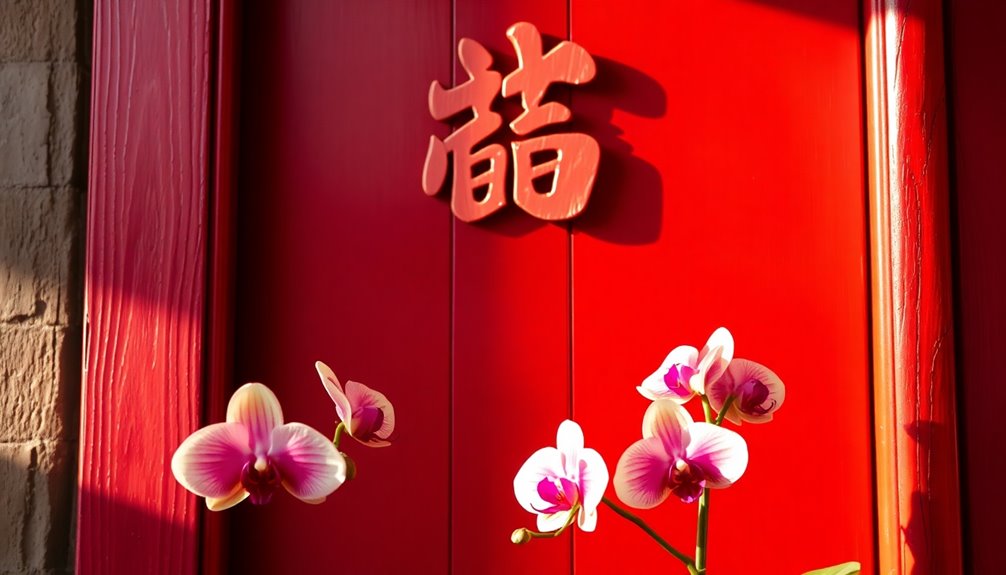
While many people may admire the character "Fu" for its traditional significance, its modern interpretations reveal a deeper cultural resonance that transcends mere superstition. You'll find that displaying "Fu" upside-down is a playful nod to its homophonic connection to good fortune arriving. This practice isn't just a quirky tradition; it enhances the festive atmosphere during Chinese New Year, uniting people across different backgrounds in shared hopes for prosperity. The character also embodies spiritual wealth, extending beyond material gains, as it reflects the importance of true prosperity in one's relationship with the divine. You'll see "Fu" in various contexts, from decorations to textiles, reflecting its adaptability in contemporary culture.
Symbolism of the Fu Character
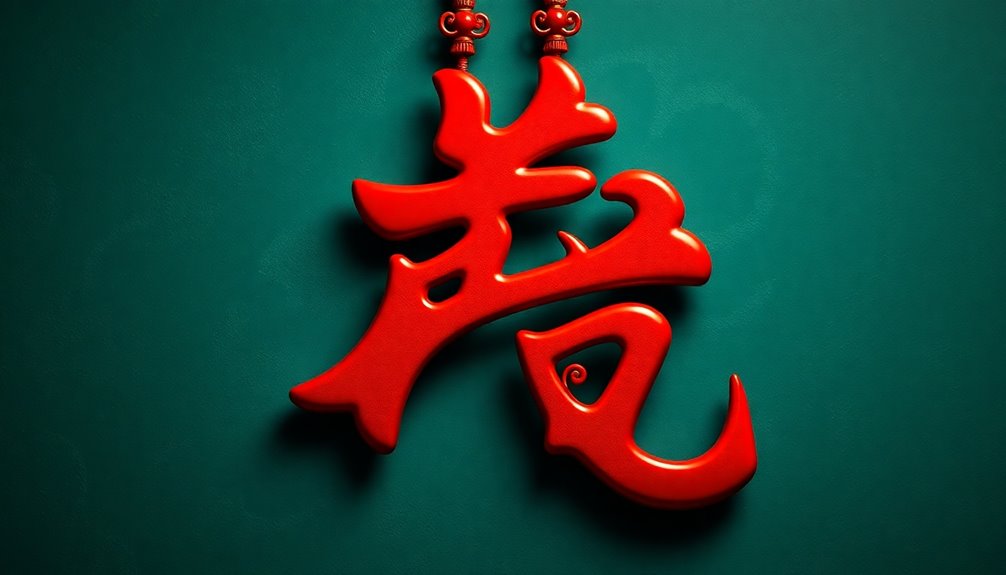
The Fu character, rich in symbolism, embodies the hopes and aspirations of the Chinese people for prosperity and happiness.
With its historical origins rooted in ancient sacrificial customs, it symbolizes offerings, abundance, and good fortune. The upside-down placement of Fu carries a clever linguistic play: it sounds like "Fu dào le," meaning fortune has arrived. This pun adds depth to its cultural significance. The upside down "fu" (福) has become a staple decoration during the Spring Festival, symbolizing hope for a prosperous year ahead.
You'll often see Fu used decoratively during the Spring Festival, hung upside down at entrances to invite good luck into homes.
Each component of the character reflects various aspects of a happy life, such as wealth and stability.
Ultimately, the Fu character serves as a profound emblem of cultural heritage and collective aspirations.
Feng Shui Considerations
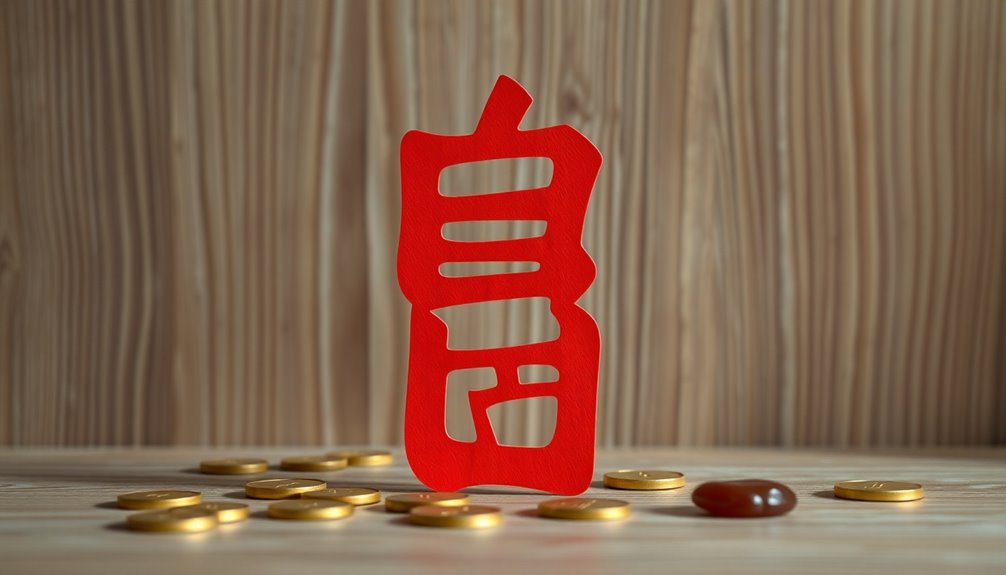
Feng Shui principles emphasize the importance of the "Fu" character in creating a harmonious living environment. You should place the character in areas with weaker energy to enhance positivity and attract good luck. Hanging the character upside down, however, can transform its meaning into a playful pun for good luck. Ensure the design remains clean and intact, as this preserves its auspicious meaning. Positioning the "Fu" character at your front door can ward off negative energies and protect your home.
For financial prosperity, place it where financial energy flows are needed. Remember, avoid placing it upside down, as this can create negative connotations. Regular maintenance is essential—keeping the character clean maximizes its protective and wealth-attracting effects, improving your overall fortune and health.
Variations Across Regions
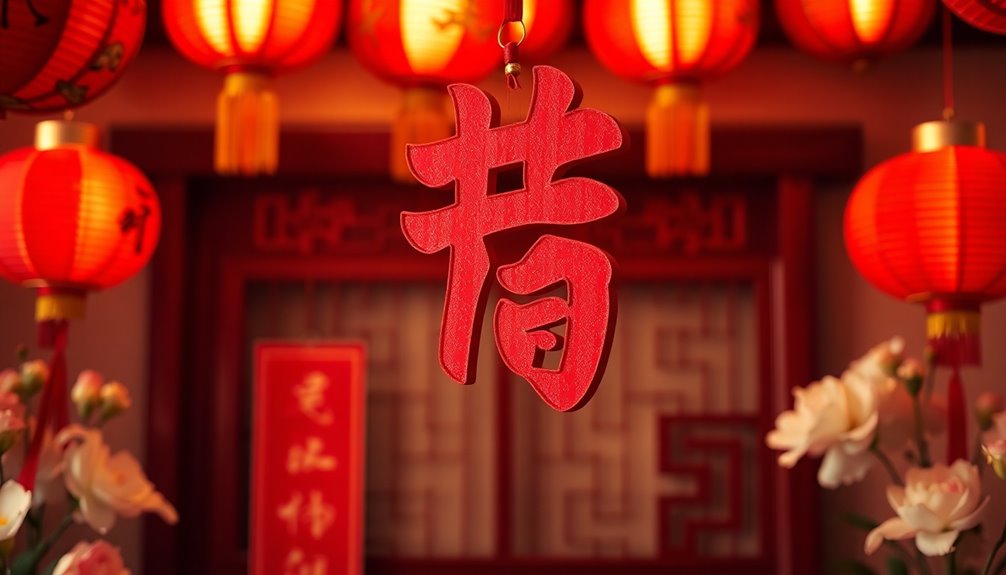
As you explore the variations of the "Fu" character across different regions, you'll discover a rich tapestry of cultural interpretations and practices.
In Singapore, families paste "Fu" upside down on their doors to invite good fortune. Meanwhile, in Malaysia, you might spot the character on festive decorations and textiles, reflecting local traditions. Additionally, the upside-down display of "Fu" symbolizes the arrival of good fortune, which is a clever linguistic play.
In Hong Kong, "Fu" plays a central role in elaborate Chinese New Year celebrations. You'll even find this beloved character celebrated globally, from the United States to France, where communities embrace its significance.
Each region adds its unique flair, but the core message of happiness and good fortune remains universal, showcasing the character's enduring appeal and cultural importance.
Influence on Chinese New Year
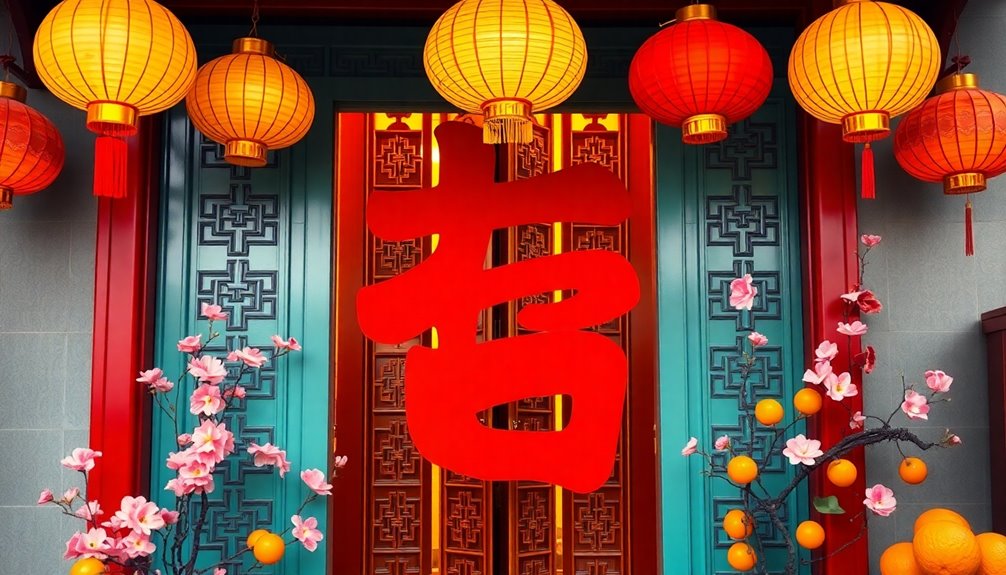
While preparing for Chinese New Year, you'll notice that the character "Fu" plays a pivotal role in the festivities. This symbol represents good fortune, happiness, and completeness, making it essential during the Spring Festival.
You'll typically see "Fu" pasted upright on the front door to welcome good fortune, while inside, it's often upside down to signify that blessings have arrived. This clever play on words adds depth to the tradition.
The practice, rooted in legends, has evolved into a beloved custom, embodying the Chinese yearning for a prosperous life. Despite modern criticisms, the upside-down "Fu" remains a vibrant expression of cultural heritage, enhancing the festive atmosphere and connecting the past with the present.
Frequently Asked Questions
What Materials Are Used to Create Fu Decorations?
To create fu decorations, you can use a variety of materials.
Traditional options include red paper, markers, and glue for attaching the character.
For eco-friendly choices, consider FSC certified or recycled paper, along with non-toxic adhesives.
Handmade elements, like solid copper or custom gold necklaces, add a personal touch.
Don't forget decorative items like pendant necklaces and ornaments that can enhance your home decor while showcasing the character fu beautifully.
How Do Non-Chinese Cultures Perceive the Fu Character?
You might be surprised to learn that many non-Chinese cultures view the Fu character as a symbol of luck and happiness.
It's recognized globally, often appearing in art and decorations, signifying good fortune. People appreciate its auspicious meaning and the rich heritage it represents.
When they see Fu, they often feel a sense of connection to Chinese traditions, reinforcing the universal desire for prosperity and joy in life.
Are There Any Specific Colors Associated With Fu Character Decorations?
When you think of the fu character decorations, red and gold immediately come to mind.
Red's considered a lucky color, often used as a background, while gold symbolizes wealth. You'll notice these colors paired beautifully to enhance the meaning of the fu character.
The diamond shape in which the character's placed also adds visual appeal, making it a striking decoration, especially during Chinese New Year celebrations.
Can the Fu Character Be Used in Non-New Year Contexts?
Yes, you can definitely use the Fu character in non-New Year contexts! It symbolizes good fortune and happiness, making it perfect for various occasions throughout the year.
You might display it in your home or office to attract positive energy, or include it in gifts to wish others luck.
It's also popular in weddings and celebrations, reinforcing blessings and prosperity, so feel free to incorporate it into your everyday life!
How Has the Fu Character's Significance Evolved Over Time?
Over 80% of Chinese households display the "Fu" character during celebrations, showcasing its deep-rooted significance.
Originally symbolizing divine protection, the character has evolved to represent broader concepts like wealth, health, and family harmony.
As you embrace this tradition, you'll find that its meanings have expanded with time, reflecting collective aspirations for prosperity and joy.
The character's journey from ancient rituals to modern celebrations illustrates its enduring cultural importance in daily life.
Conclusion
So, the next time you see the 'fu' character turned upside down, remember it's not just a quirky choice; it's a joyful invitation for good fortune to enter your home. Much like the way Cinderella's world transformed at the stroke of midnight, this simple character holds the promise of prosperity and happiness. Embrace this charming tradition, and let the spirit of 'fu' fill your life with blessings, especially during the festive cheer of Chinese New Year.
